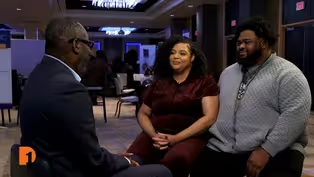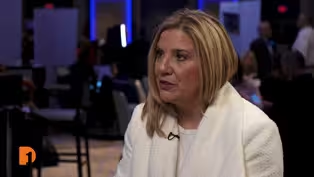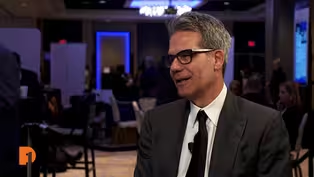
The Song Foundation bridges gaps for Michigan entrepreneurs
Clip: Season 9 Episode 31 | 6m 53sVideo has Closed Captions
The Song Foundation bridges gaps for entrepreneurs participating in the innovation economy.
Focused on fostering diversity and inclusion, the Song Foundation supports initiatives that give Michiganders a pathway to participating in the growing innovation economy. One Detroit contributor Zoe Clark spoke with Song Foundation President Dug Song and Executive Director Khalilah Burt Gaston about growing the state’s innovation economy.
Problems playing video? | Closed Captioning Feedback
Problems playing video? | Closed Captioning Feedback
One Detroit is a local public television program presented by Detroit PBS

The Song Foundation bridges gaps for Michigan entrepreneurs
Clip: Season 9 Episode 31 | 6m 53sVideo has Closed Captions
Focused on fostering diversity and inclusion, the Song Foundation supports initiatives that give Michiganders a pathway to participating in the growing innovation economy. One Detroit contributor Zoe Clark spoke with Song Foundation President Dug Song and Executive Director Khalilah Burt Gaston about growing the state’s innovation economy.
Problems playing video? | Closed Captioning Feedback
How to Watch One Detroit
One Detroit is available to stream on pbs.org and the free PBS App, available on iPhone, Apple TV, Android TV, Android smartphones, Amazon Fire TV, Amazon Fire Tablet, Roku, Samsung Smart TV, and Vizio.
Providing Support for PBS.org
Learn Moreabout PBS online sponsorship- And I'm joined now by Doug Song.
He is the co-founder and president of the Song Foundation.
So good to have you here.
And Khalilah Burt Gaston, executive director of the Song Foundation.
So good to talk to you again.
So, Doug, I wanna start with you.
You know, this whole conference, right?
We're talking about an innovation economy.
I'm so curious from you who literally is sort of like the definition of innovator.
What does that mean when you think about Michigan having a innovation economy?
- I call innovation the commercialization of invention.
We have a very strong business sector and we have a very strong research and educational sector that can connect to go produce these companies.
Now that said, entrepreneurship is much more than just that.
And there's a path around research commercialization, all that stuff, is well trod by, you know, a certain set of folks.
But really, the goal is to make sure that every Michigander has the opportunity to build a high growth, high wage business.
- And so we talk about that.
We wanna make sure that every Michigander is able to do that.
Khalilah, we're gonna talk a little bit about what the foundation does to help that.
But I'm curious right now about the paths that you see for the future of Michigan so that every Michigan, or, like, what does that need to look like so that can actually happen?
- An imperative for us is to diversify our economy.
- Yeah.
- And diversity is strength.
And we have a challenge where we're victims of our own historical success with industries that produce, again, some heavy reliance on very specific sort of economies when really, we have a rainforest.
We have all these amazing companies and people and resources, rich in intellectual capital, rich in human capital, even rich in financial capital.
- Yeah.
- But we have a challenge in that, you know, there's still a gap of what I would say is social capital.
- Yeah.
- Connect the dots and then make sure that those things don't stay siloed the way they are sometimes here today.
- Yeah.
And tell me a little bit, I mean, we've talked about this before, but how the foundation is helping to try to fill those gaps and make those connections.
- Yeah, I mean, I think the first way that we've done it obviously is through some well-placed investments.
So you heard today from Black Tech Saturdays.
That was one of our first grants to really help Johnnie and Alexa launch BTS, as well as grow it.
But a part of what we've also been doing is really working to demystify tech.
I do think that a lot of people, whether you're in government or you're in philanthropy, (indistinct) education don't understand what tech is, don't really understand the pathways and how we get from where we are now to where we need to be as a state.
- And how we make it inclusive?
Like, we've talked about this too, how we make sure that there's a quality angle to all of this, which I know is something that the foundation really works towards as well.
- We really believe that we need to make more pie in Michigan.
And so shared prosperity and collaboration is one of our values and it's something that we talk about, but something that we do.
So we've been convening tables with foundations all across the region.
We've also helped to bring together cross-sector partnerships with business, philanthropy, government.
Doug talked a little bit about our Midwest innovation roadshow, where we really got to see what other cities and states are doing in the Midwest.
And I think that was eye-opening.
Because here in Michigan, sometimes we think that we're still where we were about 20 or 30 years ago.
But we do need to make some improvements.
- Well, to that point, I'm curious about what you heard during this road show.
Where does Michigan stack up?
- We are rich in all the ingredients, right, to produce a very rich ecosystem.
But again, there are inefficiencies and gaps, and some of that are historical.
Part of that I think is kind of, again, to continue to sort of focus on kinda a top-down sort of approach where innovation ecosystems require community.
And the secret ingredient behind almost any working environment, innovation system is a environment community at the center of that where there's investments in people, in relationships and the networks that actually, you know, bring people together.
Because technology is not its own sector.
Actually, technology is every sector, right?
It's like electricity, right?
It sort of powers everything that we do in almost every area of our lives these days.
And if we don't take the time to enable folks, right, to be able to wield those tools of change and opportunity, then technology will shape society instead of vice versa.
And we need technology to work for people.
We need an economy that works for people.
- So you said sort of top-down.
Do you think folks at the top understand or hear that message that community does need to be more involved?
- I think a part of it is really helping to bring people together that otherwise wouldn't be in rooms together, right?
And so you have community leaders, you have business leaders, you have investors who are all talking, whether that's sharing a meal together or going over a trip.
You know, I think that's really important, and that's some of the social capital and social networking that doesn't happen as much as we need it here in Metro Detroit.
- What happens to the state if we don't get on board, right?
Like, I'm not looking for some dire prediction, but, like, what will the state continue to look like?
We've had conversations about population loss, about other states getting, you know, folks coming in, starting these businesses.
What happens if we don't get on board?
- Well, I have a 13-year-old daughter who says that living in Michigan is like watching a dinosaur become extinct.
So that was like a dagger right in my heart, right?
As a mother who wants her to stay here, you know, raise a family.
But I just joined a board and they said that right now the economic indicator was that we needed 60% of Michiganders to have some sort of post-secondary degree.
Right now, if you look at the economic and educational indicators, that's 72%.
And it's growing every day because our economic indicators, like income and wealth, continue to decline.
So that's where we are as a state.
And I think that unfortunately, people don't really see that data, they don't really embrace it.
And more importantly, they don't understand the strategies that will help us address it.
- I hate to paint too negative of a picture or anything, but I'll just say, I've heard people talk about the unfortunate demise of Michigan at some point being, because it's old and cold, right?
If we can't figure out how to retain young people, well, they're not gonna change the cold, but if we can't retain young people, they are (indistinct) our future.
And again, we've seen demographics equal destiny in so many other parts of the world where, again, whether aging economies are struggling to actually care for their populations the way that they need, we need to have our young people as invested in our future because we're invested in their success in their future.
Black Tech Saturdays is building an inclusive tech ecosystem in Detroit
Video has Closed Captions
Clip: S9 Ep31 | 5m 48s | The co-founders of Black Tech Saturdays discuss building an inclusive tech ecosystem in Detroit. (5m 48s)
Ford invests in the future of mobility in the Motor City
Video has Closed Captions
Clip: S9 Ep31 | 5m 56s | Michigan Central COO Carolina Pluszczynski talks about investing in the future of mobility. (5m 56s)
New report highlights Detroit-Ann Arbor Innovation Corridor
Video has Closed Captions
Clip: S9 Ep31 | 4m 40s | Richard Florida talks about the possibilities for the Detroit region’s innovation economy. (4m 40s)
Providing Support for PBS.org
Learn Moreabout PBS online sponsorship
- News and Public Affairs

Top journalists deliver compelling original analysis of the hour's headlines.

- News and Public Affairs

FRONTLINE is investigative journalism that questions, explains and changes our world.












Support for PBS provided by:
One Detroit is a local public television program presented by Detroit PBS


